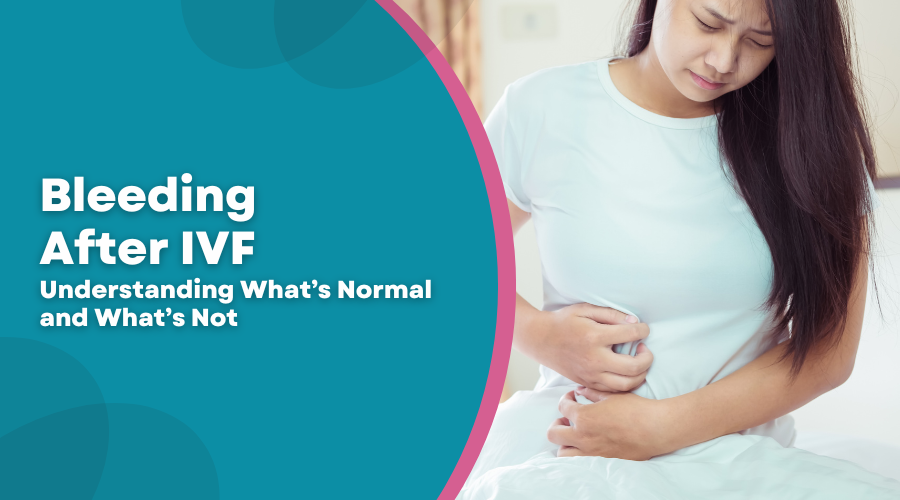In vitro fertilization (IVF) is a medical procedure used to help individuals or couples struggling with infertility. It involves combining an egg and sperm outside the body to create an embryo, which is then transferred into the uterus to establish a pregnancy. IVF has provided hope to many, but it comes with its own set of challenges and concerns. One of the most commonly asked questions is about bleeding after IVF—whether it is normal and what it signifies.
Dr. Nisarg Patel, an experienced IVF specialist at Nisha IVF Centre in Ahmedabad, emphasizes that bleeding after IVF is not uncommon. “Some light bleeding or spotting may be experienced when the embryo implants into the uterine lining. However, pay attention to the type and amount of bleeding as it could also be a sign of something else,” says Dr. Patel. Knowing the causes of bleeding is essential for your IVF process and can assist in deciding what your next step for treatment will be”.
At Nisha IVF Centre, led by Dr. Nisarg Patel, patients receive top-notch IVF treatment with personalized care. Dr. Patel’s expertise in fertility treatment has made him one of the most sought-after IVF doctors in Ahmedabad. Whether you’re experiencing bleeding during IVF or want more information about IVF-related concerns, team Nisha IVF is here to guide you every step of the way.
Is Bleeding After IVF Normal?

Most women experience some bleeding after IVF, and this sometimes can be absolutely normal. Spotting may occur when there is implantation, as the embryo embeds into the uterine wall. Implantation bleeding typically happens between 6 to 12 days after the embryo transfer and is extremely light and transient.
But heavier bleeding or bleeding at other times during the IVF process may be an indication of something else. Be aware that how heavy the bleeding is and when it occurs can be extremely helpful in determining the pregnancy’s health. Dr. Nisarg Patel advises, “If you do have any bleeding after IVF, it is worth keeping an eye on how heavy and how long it lasts, as this will allow your doctor to decide what to do for you.”
Possible Causes of Bleeding After IVF
Several factors can cause bleeding after IVF, and understanding these can help alleviate concerns. Some of the possible reasons include:

Implantation Bleeding:
As mentioned earlier, this occurs when the embryo embeds into the uterine lining. It’s typically light and short-lived.
- Hormonal Changes:
IVF treatments often involve hormone injections to stimulate the ovaries and prepare the uterus. These changes can lead to minor bleeding or spotting.
- Progesterone and Estrogen Therapy:
Medications to support pregnancy may cause irritation of the cervix or uterine lining, leading to light bleeding.
- Cervical Irritation:
The process of embryo transfer can sometimes cause irritation or minor trauma to the cervix, leading to spotting.

Ectopic Pregnancy:
Although rare, bleeding can sometimes indicate an ectopic pregnancy, where the embryo implants outside the uterus.
Difference Between Implantation Bleeding and Period Bleeding After IVF
After an IVF embryo transfer, it’s crucial to distinguish between implantation bleeding and period bleeding, as they have different implications for your pregnancy.
- Implantation Bleeding:
This is usually lighter than a regular period, often appearing as light spotting or pinkish/brown discharge. It typically occurs 6–12 days after embryo transfer.

Period Bleeding:
A menstrual period is heavier, accompanied by more intense cramping and a darker, red blood flow. It usually happens around the expected date of your period and may be a sign that the IVF treatment has not resulted in a pregnancy.
Dr. Nisarg Patel advises, “If you experience heavy bleeding or cramping, it may be worth consulting your IVF doctor to rule out any complications.”
What Should You Do If You Notice Bleeding?
Noticing bleeding or spotting after IVF can be worrying, but it doesn’t always signal something wrong. Here are some steps to follow if you experience bleeding:
- Track the Bleeding:
Keep a record of when the bleeding started, how much you’re bleeding, and whether you’re experiencing any pain or cramping.
- Avoid Stress:
It’s important to stay calm and avoid stress. Emotional well-being plays a crucial role in fertility treatments.
- Contact Your IVF Doctor:
If the bleeding is heavier than spotting, or if you’re concerned, contact your IVF specialist. They may advise an ultrasound or blood test to check hormone levels and assess the situation.
Emotional Impact of Bleeding During IVF

Bleeding after IVF is not only a possible physical interruption but can also be highly emotionally traumatic and creates uncertainty and anxiety. IVF is an intensely emotional process, and fear of miscarriage or failure is extreme. Such feelings should be recognized and addressed.
The majority of women experience a feeling of loss or dissatisfaction, especially if they had a lot of hopes for this cycle. Dr. Nisarg Patel states, “Emotional support is as useful as care in terms of physical aspects. We wish to maintain the lines of communication open because that allows our patients to manage the apprehension of IVF treatment.”
When to Seek Urgent Medical Help?

While heavy bleeding after IVF is not uncommon, there are times when you should get immediate medical care. These are:
- Heavy Bleeding:
Heavy bleeding as if you’re having your period or worse, it’s very important to get a physician’s advice.
- Severe Cramps:
Intense cramping or discomfort, especially if it also has heavy bleeding, may signal an issue.
- Fainting or Dizziness:
If you experience dizziness or fainting, it’s crucial to get medical help immediately.
Dr. Nisarg Patel advises, “While most cases of bleeding are manageable, don’t hesitate to reach out if something feels off or if you’re concerned.”
Conclusion
IVF bleeding can be alarming, yet understanding why and when to seek medical care can make a big difference in your IVF cycle. From spotting implantation bleeding to a severe issue, being aware of your symptoms and open communication with your IVF doctor is essential.
At Nisha IVF Centre in Ahmedabad, Dr. Nisarg Patel and team are dedicated to providing you with the complete spectrum of care and support along the journey with your IVF. With adequate guidance, you can get over any troubles and go ahead confidently.
Frequently Asked Questions
Is bleeding after IVF embryo transfer a good sign?
How long does implantation bleeding last after IVF?
Can you still be pregnant if you bleed after IVF?
Does bleeding always mean IVF has failed?
Should I stop progesterone if I see bleeding after IVF?
Reference Links:
https://www.embryo.net/post/spotting-after-ivf-should-you-be-concerned
https://www.americansurrogacy.com/surrogate/bleeding-after-ivf-embryo-transfer
Disclaimer: The information shared in this content is for educational purposes and not for promotional use.


